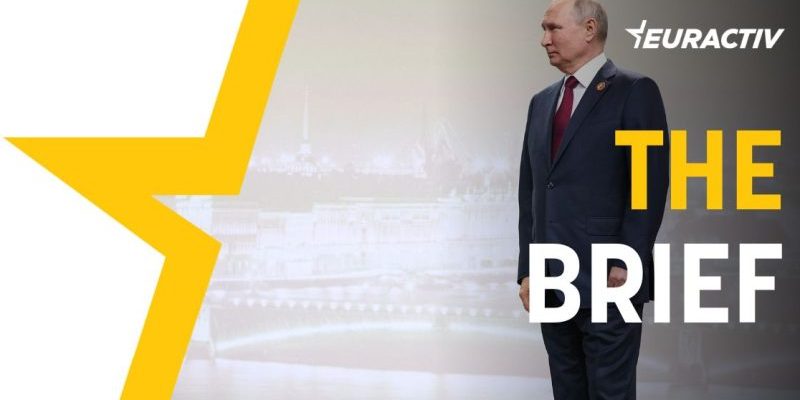The two-day Russia-Africa summit in St. Petersburg, which started on Thursday (27 July), was supposed to demonstrate President Vladimir Putin’s enduring political influence in the continent. Instead, just 17 African leaders made the trip, fewer than half of the 43 who went to the first Russia-Africa summit in Sochi four years ago.
That marks a major setback for the Kremlin, which said last week that it had received participation confirmation from 49 countries.
Following Russia’s decision to withdraw from the Black Sea grain initiative, which allowed Ukrainian grain exports to travel south, Kremlin spokesman Dmitry Peskov told reporters that Russia would step in to replace Ukrainian grain supplies to needy countries free of charge.
“The poorest countries in Africa have benefited the least” from the Black Sea initiative, said Peskov.
With the knowledge that the African continent is reliant on grain supplies from Ukraine, that was a particularly cynical bit of diplomacy, and it appears to have backfired.
Peskov is spinning that the poor attendance results from “absolutely blatant, brazen interference by the United States, France and other states” to pressure African leaders not to go to St. Petersburg.
The relative lack of interest will encourage EU and Ukrainian officials, who have probably been disheartened by the equivocal stance taken by many African states on Russia’s invasion of Ukraine.
Both have stepped up their diplomatic efforts with African leaders, with Ukraine opening a series of new embassies across the continent and President Volodymyr Zelenskyy hosting a group of African leaders pushing for peace talks.
Earlier this month, Jutta Urpilainen, the EU’s commissioner for international partnerships, told the European Parliament during a debate on the EU’s Africa strategy that the bloc faced “a battle of narratives” for political influence on the continent.
The EU’s record in that ‘battle’ has been mixed so far.
African diplomats were disappointed by the EU’s failure to consult with them over the recently agreed Carbon Border Adjustment Mechanism, which could hurt African exports despite the continent being only a tiny contributor to global carbon emissions.
However, last month the European Commission concluded a deal with Namibia on critical minerals and raw materials as part of the EU’s attempts to wean itself off Chinese goods and encourage Africa’s green transition, and the bloc’s Global Gateway infrastructure investment programme is now releasing funds.
In some respects, Russia’s Foreign Policy Concept, the revised version published in March, is stronger on African relations than the EU’s.
It states that Moscow will support Africa as a “distinctive and influential centre of world development” through improved bilateral relations, trade, and scientific and humanitarian cooperation.
But that makes the damp squib in St. Petersburg all the more embarrassing.
_ _ _ _ _ _ _ _ _ _ _ _ _ _ _ _ _ _ _ _ _ _ _ _ _ _ _ _ _ _ _ _ _ _ _ _ _ _ _ _ _ _ _ _
** This is the last edition of the Brief before the summer break: We’ll be back later in August. **
Today’s edition is powered by Chemours
Fluorochemistries: building blocks of modern society
Fluorinated chemistry is critical for Europe’s green and digital transition. However, wider industry adoption of cleaner energy solutions won’t be possible without the right innovations in chemistry.
Find out more >>
The Roundup
Greek government ministers have been under spyware surveillance, including when communicating with their European peers, according to the latest findings. But EU institutions insist on considering the matter a national affair.
As quantum-powered cyber-attack threats become more real by the day, liberal democracies and autocratic regimes are racing to develop quantum-safe encryption. But Europe risks being a spectator.
French opposition leaders have called for the resignation of the Interior Minister Gérald Darmanin and police chief Frédéric Veaux in a row over the police’s heavy-handed response to the riots that have swept across French cities in recent weeks.
While climate adaptation plans across European cities are improving, a lack of funding and staff shortages still deter municipalities from investing in climate mitigation and adaptation measures, a European Investment Bank (EIB) survey found.
Italy said on Thursday it planned to use EU money to fund an investment programme worth around €19 billion to strengthen power and gas grids and make its economy greener.
Check out our video explainer of the EU’s mid-term budget review, as well as the comprehensive Agrifood Special CAPitals Brief, the last before the summer break, and the CAP tracker.
Look out for…
- Commissioner Helena Dalli in Gandhinagar, Gujarat, India, joins G20 Ministerial Meeting on Women Empowerment, Wednesda-Friday.
- EU institutions in summer recess.
Views are the author’s
[Edited by Zoran Radosavljevic/ Alice Taylor]

